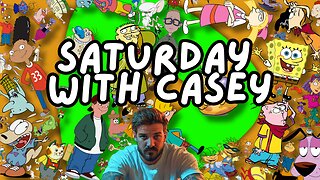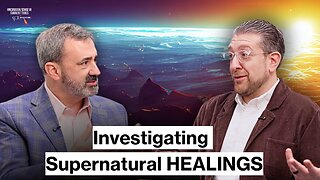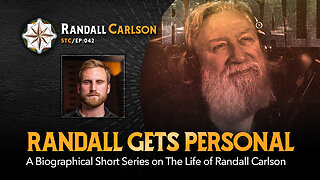Premium Only Content

What Happens When We Die
For centuries, the question of what happens after we die has been relegated to the realms of philosophy and religion. However, recent scientific inquiries into near-death experiences (NDEs) are challenging the notion that consciousness is merely a byproduct of brain activity. Here, we delve into the compelling evidence suggesting that consciousness might indeed transcend the physical confines of our brain, hinting at the possibility of life after death.
...
NDEs are profound psychological events typically occurring to individuals close to death or in situations of intense physical or emotional danger. Common elements include out-of-body experiences (OBEs), where individuals report floating above their bodies, seeing light, entering another realm or dimension, meeting deceased relatives, and experiencing a life review.
...
Neurological Explanations Fall Short: Traditional neuroscience posits that consciousness is solely a product of brain function. However, this view struggles to explain how patients with significantly impaired brain function during cardiac arrest, where no electrical activity should allow for cognitive processes, report vivid and lucid experiences.
...
Vicki Umipeg was prematurely born at 22 weeks, weighing 3 pounds. Her optic nerve was damaged due to high oxygen in the incubator, resulting in complete blindness. She had no visual experiences, no awareness of light whatsoever.
...
At the age of 22, she was thrown out of a car in Seattle, resulting in severe injuries—skull fractures, concussion, and injuries to her neck, back, and leg. While being rescued in the hospital, she found herself floating to the ceiling.
...
She had panoramic vision and saw a woman’s body lying on a metal operating table, with a male and a female medical staff working to save her. When she noticed the distinct wedding ring on the woman’s hand, she realized it was her ring, and the woman lying there was her.
...
Perhaps one of the most cited cases in NDE research concerns a woman named Pam Reynolds, who underwent a surgical procedure for a brain aneurysm where her body temperature was lowered, her heart stopped, and her brain showed no activity. Yet, upon revival, she described specific details of the surgery, including the surgical instruments and conversations, which were confirmed by the medical staff. This suggests consciousness persisted even when her brain was clinically 'off'.
...
Some physicists and neuroscientists propose that consciousness might operate on a quantum level, where it could exist independently of the brain. Theories like Orchestrated Objective Reduction (Orch-OR) by Stuart Hameroff and Sir Roger Penrose suggest that consciousness can be understood as a quantum process that doesn't disintegrate after death in the way classical physics would predict.
...
Shared Death Experiences (SDEs) occur when living individuals report experiencing aspects of the death process with someone who is dying, including seeing the same light or deceased relatives, without themselves being near death or ill.
...
Many report sensing, seeing, or being visited by deceased loved ones. This is called After-Death Communications (ADCs). While often dismissed as grief-induced hallucinations, the consistency and specificity of these ADC experiences across cultures and ages suggest something more might be at play.
...
There's also this area of scientific study called Reincarnation Research that provides a different angle on the topic. For example, Dr. Ian Stevenson works with children who remember past lives. These children often have memories, birthmarks, or congenital deformities that correspond eerily well with the lives and deaths of deceased individuals they claim to have been.
...
The cumulative evidence from NDEs, quantum theories, and paranormal research does not prove life after death in the traditional sense but invites us to expand our understanding of consciousness. It suggests that consciousness might not be entirely dependent on the brain, opening the door to the concept that some form of awareness may indeed survive bodily death.
...
While skepticism is healthy and necessary, the dismissal of these experiences without investigation does a disservice to our quest for understanding human consciousness. The implications of consciousness being nonlocal or surviving bodily death are profound, potentially reshaping our views on life, death, and what it means to be human. Therefore, rather than being some fringe theory, life after death could be seen as a frontier of scientific inquiry, beckoning us to look beyond our current limitations and into the vast possibilities of human existence.
-
 10:04
10:04
FreedomMovement
20 days agoBroken Promises Caused Ukraine War
279 -
 14:16
14:16
Talk Nerdy Sports - The Ultimate Sports Betting Podcast
4 hours ago3/22/25 - March Madness: Who Wins Today? Vas & Riste Pick Every Game!
33.2K1 -
 3:02:33
3:02:33
RG_GerkClan
6 hours ago🔴LIVE - Lets Dominate this Weekend - Escape From Tarkov - Gerk Clan
51.1K2 -
 4:59:23
4:59:23
SoundBoardLord
7 hours ago90's Saturday Morning Cartoons, Chill Vibes & Great Conversations
43.5K1 -
 13:55
13:55
ThinkStory
1 day ago107 Hidden Clues & Details You Missed In Severance Season 2!
40.9K2 -
 24:54
24:54
CatfishedOnline
1 day agoVictim will NOT leave her Romance Scammer
32.7K6 -
 12:49
12:49
MTNTOUGH Fitness Lab
1 day agoNick Jones: Subzero Saunas and Sucking at Sports | MTNTOUGH Lab Visit
33.5K2 -
 29:47
29:47
TampaAerialMedia
7 hours ago $1.66 earnedUpdate SIESTA KEY, FL 2025 - Come Back after Hurricanes Helene & Milton
29.2K2 -
 29:36
29:36
Uncommon Sense In Current Times
23 hours ago $1.60 earnedMiraculous Healings: Faith or Science? | Billy Hallowell
29.3K4 -
 1:14:26
1:14:26
Squaring The Circle, A Randall Carlson Podcast
7 hours agoEP042-PT1 A Biographical Look Into The Life of Randall Carlson With Guest Warren Steury
20K5